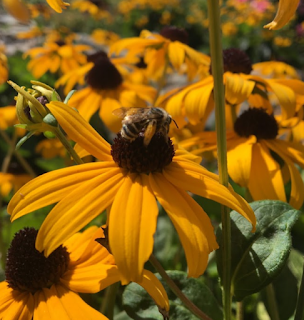Posted by: Jan Behler, Douglas County Colorado Master Gardener
When people hear the word “pollinators” they usually think of bees, but ants, beetles, butterflies, flies, hummingbirds, and moths are also primary pollinators in our state. Pollination is the transfer of pollen to stigma, within or between flowers and plants. A plant’s flowers need to be pollinated to complete their life cycle of producing fruit and seeds that make more plants.
Photo Credit: John Murgel, Douglas County Horticulture Agent
Photo Credit: John Murgel, Douglas County Horticulture Agent
Here are a few action items to protect these important contributors to food production and beauty in our world:
- Plant flowers in groups. Groupings or clumps of plants will attract more pollinators than single plants scattered. A bee or butterfly will feed more if they don’t have to travel too far between plants.
- Think of providing flowers throughout the season. Plant a variety of plants that flower at different times to offer continuous pollen and nectar sources. A few examples of spring plants could include blue flax, allium, crocus, and serviceberries. For summer you might try blanket flower, bee balm, lavender, and sage. For fall, hyssop, coreopsis, common sunflower, and golden rod.
- Use insecticides carefully, if at all. This is self-explanatory!
- Grow native flowering plants which are adapted to local soil and climate. Plant Select has many great plant recommendations that are suited to Colorado and known for their hardiness and low water consumption. For a good list of native plants, check out the CSU Extension Website for the fact sheets: NativeHerbaceous Perennials for Colorado Landscapes – 7.242 and CreatingPollinator Habitat – 5.616
It is quite amazing but there are over 950 species of bees in Colorado alone. Did you know that hummingbirds can fly backwards and upside down? Also, the average lifespan of those beautiful adult butterflies is roughly three to four weeks so take a moment to look around in your yard and notice the pollinators and be kind to them this June and always!




Great reminders and facts! I didn’t realize that the average butterfly lifespan is just 3-4 weeks. I feel honored to host them in my garden.
ReplyDelete